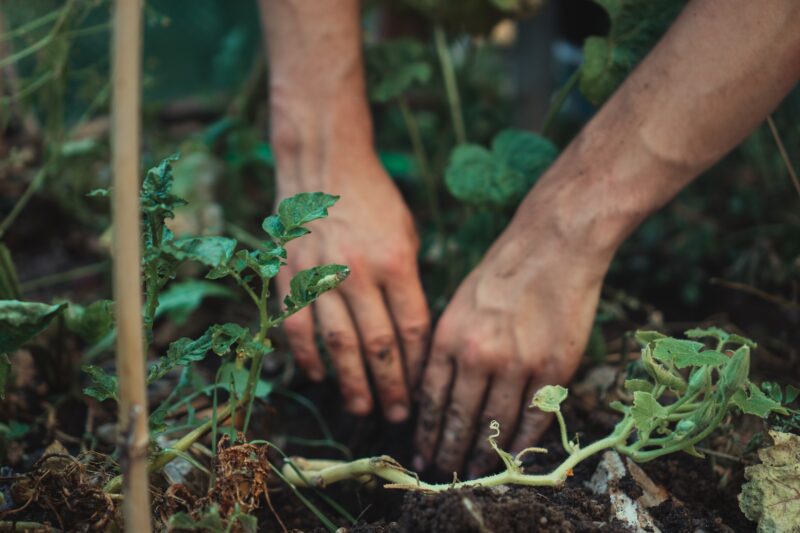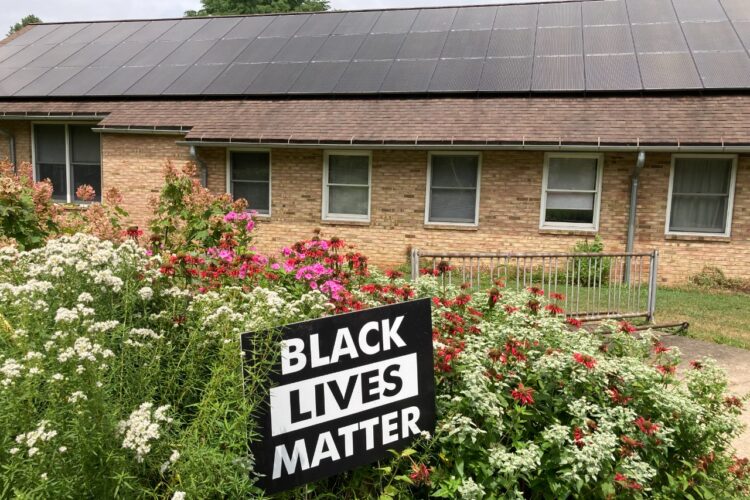Simplicity and Right Relationship

by Bill Cahalan.
I agree with Wendell Berry, who wrote in his 1977 book, The Unsettling of America, that the United States is an unsettled country. We, not only in North America but in all the industrial world, are disconnected from our natural sources. So most of us only vaguely feel our dependencies upon the non-human, natural world. Even if we understand some of them, we tend not to experience them in an immediate way. I’ve been struggling with this for decades. If I don’t sense my dependencies, how can I truly experience the gratitude and energy I need for living in right relationship or harmony?
I think we Friends need to develop our testimony of Simplicity to include the ideal of reconnecting with our sources, by getting more of what we need within our home regions. As families, neighborhoods, and meetings, we can grow, buy, or barter for more of our food close to home, and engage in growing practices that preserve the topsoil and the water. We can harvest rainwater from our rooftops to fill tanks for watering our lawns, meadows, and gardens— even, with the right filters, for drinking. We can get wood for heating from local dead trees or downed limbs versus burning gas from highly destructive fracking. Household electricity can come from solar cells and wind systems rather than, as often occurs, from blown-up mountain tops. Bodily waste can, through compost toilets, return nutrients to soil versus flushing it into sewage treatment plants where some is incinerated, some land-filled, and some passed through to streams. Otherwise, “our heads don’t know what our hands are doing.” We don’t see how we deplete distant lands when life necessities are brought in via many middlemen from long-distance.
We have an “out of sight, out of mind” economy. It results in our enclosure within a techno-bubble which is seductive because, if you have the money, it makes life quite plush and easy. No wonder it is addictive, and we tend to become highly focused on getting along well as workers and owners of property. Nature is our property which we manage, rather than a living community or “great family” which we belong to and serve or tend. When life is focused in such a way, we have tunnel vision in relation to non-human nature. It ceases to be a primary focus, shifting to background awareness. We tend to see it as an “environment,” not a sacred, interdependent, intelligent community which is essential not only for physical sustenance but spiritual fulfillment. “The fate of our times is characterized by intellectualization, rationalization, and above all by the disenchantment of the world,” wrote Max Weber a century ago, in Protestantism and the Spirit of Capitalism.
So living simply includes non-attachment to belongings and “stuff,” but also communion with the creation. This means the living and sacred world is recognized as alive and as having the right to exist, evolve, and thrive for its own sake, not just for the sake of one of its species, our own. And this does not imply any one theology. It can just as well involve the sense of a divine Creator who is both beyond as well as within all things, as it can a self-organizing universe. No matter what happens in coming decades with human-generated climate chaos, or with the ceaseless unraveling of Earth’s web of life, we can live with simplicity and integrity as we move toward right relationship. We can move toward a conversational, “listening,” and regenerative relationship rather than a controlling and domineering one with non-human nature. But we need to engage in this journey with each other, not only in our families and larger local communities, but also as neighborhoods. This is what many in my own neighborhood have been trying to do for several decades as an ecocommunity or “ecovillage.” We have a long way to go, and we’ve had our ups and downs, but for me it has been a grounded and fulfilling way to live.
Bill Cahalan is a psychologist who includes relationship with Earth in therapy and retreats. He is a member of Community Friends Meeting in Cincinnati, and lives in an aspiring ecological neighborhood.

